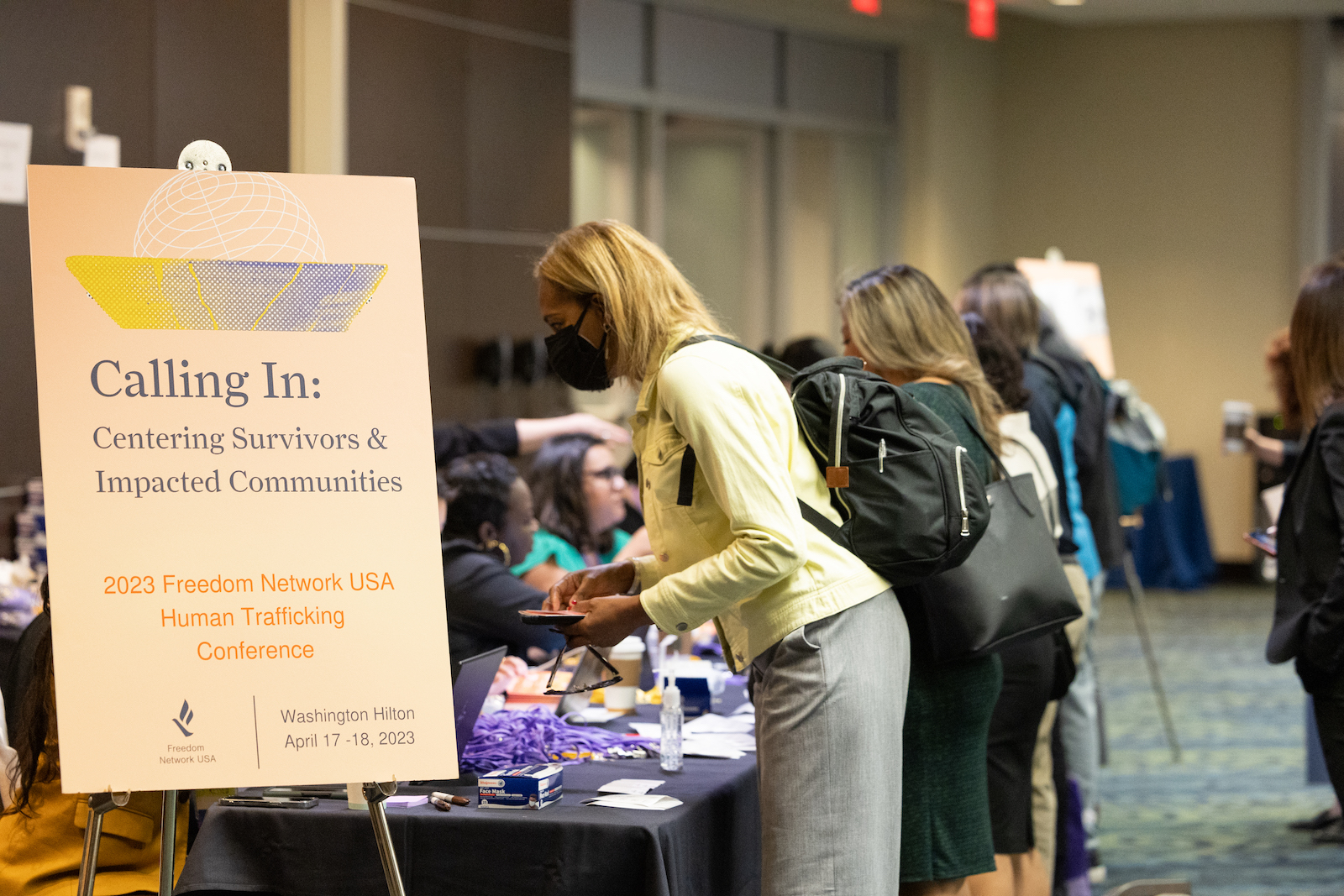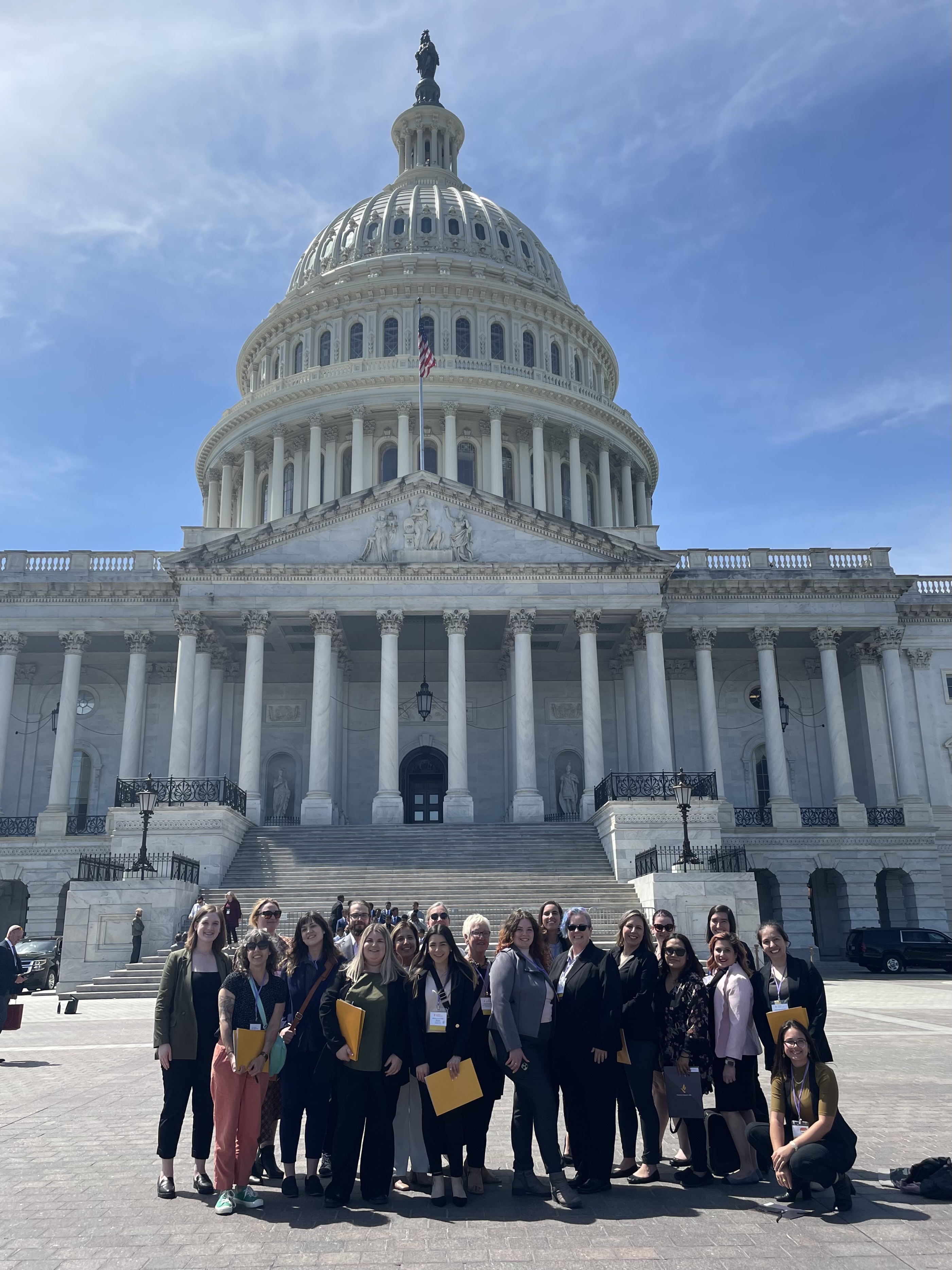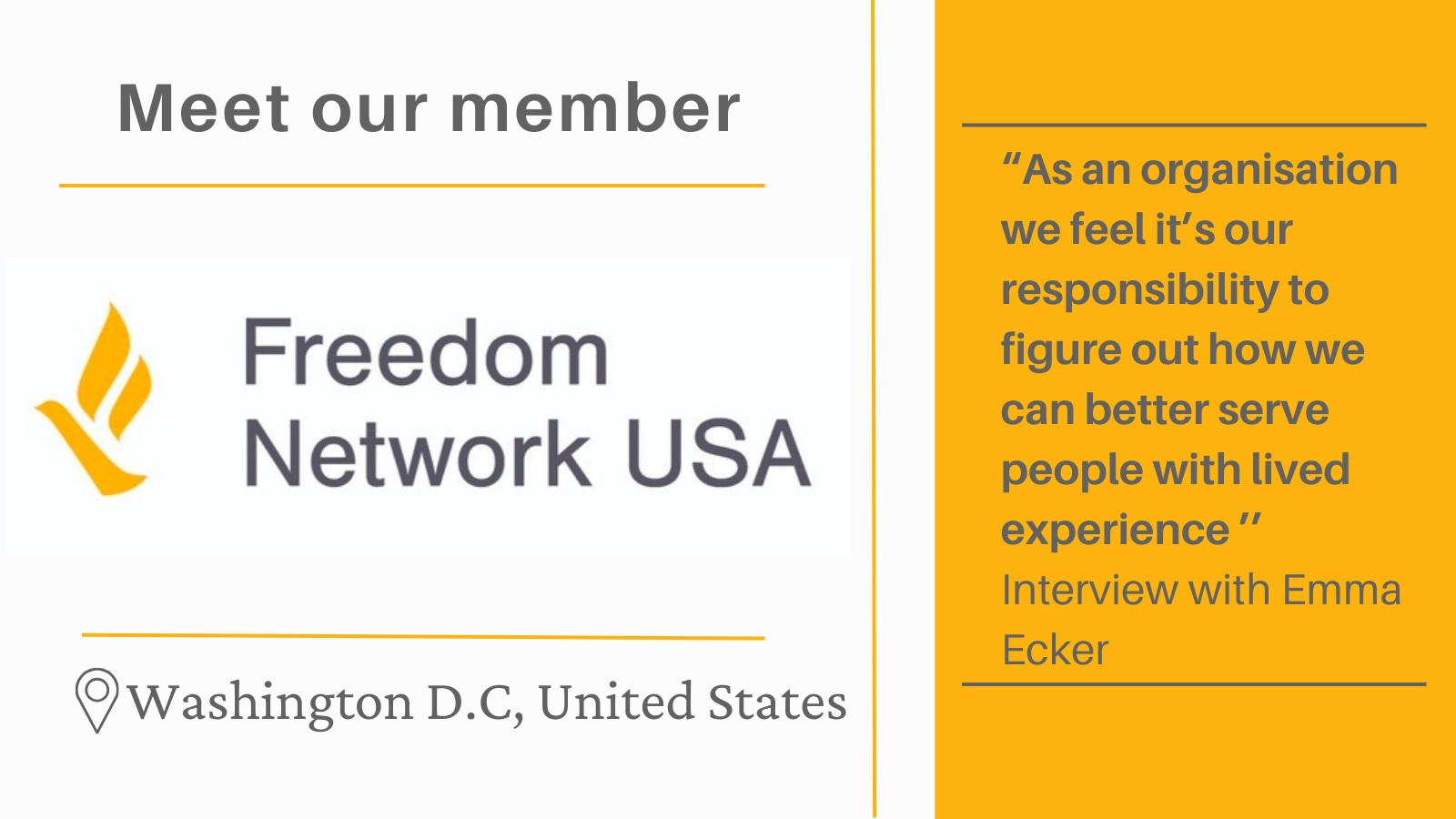Freedom Network is a new GAATW member in the United States, but an old friend of ours. Vivian Cartagena from the GAATW Secretariat conducted this interview with the organisation’s Senior Policy Specialist, Emma Ecker, in October 2023 to better understand their work, history and context.
Vivian: Thank you, Emma for taking the time to speak with me. Could you tell me more about how and why Freedom Network USA was formed?
E: Our founding members worked on human rights, women’s rights, children’s rights, immigrants' rights, farm workers’ rights, social services, and other forms of advocacy. Some of them were working on these issues already in the 1990s - they had cases around home workers’ rights, sexual exploitation, migrant workers, and so on. But at that point, the US only had anti-slavery legislation, there wasn't actually an anti-trafficking framework as there was in some other countries. And our founding members came together to form a network on the basis that human trafficking was a human rights issue and that it was basically a denial of those human rights. They were instrumental in the development of the first US anti-trafficking legislation, the Trafficking Victims Protection Act (TVPA), which passed in 2000.
One of their first conferences was in 2002, which brought together social services providers, legal service providers, and advocates to talk about what human trafficking meant and how to provide services to survivors from a human rights-based approach.

Then, the network was formally registered as a non-profit in 2015;we have about 96 members now. It’s a mix of social services providers, survivors, legal advocates, and immigration advocates, so basically, all the different people who are serving survivors in the US. We have a few internal programmes, but the network is really rooted in our membership, like learning from our members and putting forward solutions, as a coalition.
Vivian: Does Freedom Network provide direct services or is it only through your members?
E: We at the network secretariat have only one direct services programme - the Survivor Re-Entry Project. That’s a mix of training and technical assistance for legal service providers who are applying for criminal record relief for their clients, or are helping clients/survivors work on the process of applying for a criminal record relief. That’s one of the big issues in the United States. Many survivors have criminal charges related to their trafficking experience, so we help on a state-by-state basis, where clients can apply for relief.
The rest of our programmes serve social service providers, not clients directly, but most of our members provide such services. They provide housing, legal services, immigration support, mental health services, shelters, etc. Basically, everything. We bring forward their concerns to the policy level because service providers do so much work and some of them don’t have enough time to do advocacy to improve legislation and policies.
Vivian: What are the main dynamics related to international advocacy work, especially as a network?
E: Well, that’s something we’ve been getting into now, especially as members of GAATW. We’ve been very focused on federal legislation, things that would have an impact within the United States. Most of our work with international advocacy organisations is around migrant workers’ rights because many people come here for work, or for other reasons, and face a lot of issues here. So that’s where our advocacy work has been focused with other organisations, so we can amplify their requests, and make sure that we are addressing their needs.
Vivian: What would you say are the most challenging issues within that advocacy work? We know that migration to the United States is such a big topic…
E: I think that the most challenging thing for us is making sure that services are entirely voluntary. We have a lot of service providers in the country that just want to be involved in some way, but don’t necessarily have the background on how to make sure that their services are client- and trauma-informed, and survivor-centred. So one of our biggest challenges is ensuring that resources are available to everyone and survivors have access to good services in the U.S. That’s actually a huge gap that we have. The US focuses a lot on the law enforcement response and sort of leaves out the protection of survivors and ensuring they have everything they need to recover and not be re-exploited. 
Another issue is prevention. The United States does not really focus on primary prevention, it is very much a reactive response. We like to address violence after it’s been created and not to prevent it from happening in the first place. So the usual challenges that we’ve seen throughout programmes and throughout our members' experiences is that there’s a huge gap between resources available for those two issues.
Vivian: Yes, prevention is really important. Does Freedom Network engage in prevention work, whether through members or as a network?
E: Yes, that’s something we’ve been working with our members, figuring out where we can support their prevention work and where prevention advocacy work aligns with other types of violence prevention efforts in the United States. There’s a missing connection between the trafficking movement and gun violence prevention and community violence prevention, which have really effective programmes in place. We are working to see where we can connect these pieces.
For example, we have one programme related to technical assistance for government-funded housing service providers, making sure that while serving people they’re also preventing them from being re-exploited by providing everything they need.
Vivian: How is your relationship with authorities? Because trafficking prevention and care is not only NGOs’ responsibility, but the State’s. How do you work with the state?
E: We have a lot of connections within different areas of the US government. We do a lot of legislative work with Congress to ensure that legislation is human rights compliant, and oppose legislation that is not. We've also been working with the government and some agencies where we can bring the issues of our members and try to find solutions to have a greater impact. This is really important because our members provide services in only one city or state, and we can bring their concerns to the national level. That’s one of the greatest impacts of the network.
Vivian: How do you incorporate the voices and concerns of your member organisations and of survivors of trafficking in your work?

E: We have quite a few members who have lived experience of trafficking as well as survivor-led organisations. And so, whenever we start to address an issue, we have a meeting internally with our members just to talk through the impacts and solutions, to get inputs from people with lived experience. We’re also creating spaces where survivors can introduce themselves as experts and be recognized as experts. And we encourage other organisations to do the same, even if they’re not our members.
The Biden administration has internal working groups that we have been encouraging to create spaces where survivors are allowed to hold the conversations themselves. So we started using our connections to ‘’open the door’’ and let them lead, which is still a work in progress.
Vivian: Do you work with other international organisations or networks?
E: We’re still building those and figuring out where we fit internationally because our members are all from the US. There are a few organisations that we know do great work and have programmes internationally, so we talk with them when there are international issues that we need to consider. We’re still figuring out where we fit in.
Vivian: I know that you’ve been working with GAATW for many years, but you only recently joined as a member. What does it mean for Freedom Network to be part of the alliance?
E: We’re honestly so excited to have an organisation that is so closely aligned to our values. Sometimes, we feel like a lonely voice in the US that’s promoting the rights of all people, including sex workers. So, being aligned with GAATW and being able to connect with other organisations globally that are aligned with our values, is so awesome. It allows us to do a better job.
Vivian: It’s very nice to hear that, thank you! My last question is, what are your work plans for the future?
E: We’re always looking for more members that are aligned with our values who can bring more voices to the table and connect with other movements where partnership is very valuable. So growing that network internally and externally and working with other organisations to make sure the world becomes a better place, is really important. One of the biggest goals for the future is to include survivors’ voices and make sure that survivors are actually leading the movement. As an organisation we feel it’s our responsibility to figure out how we can better serve people with lived experience.

We also want to expand our programmes. We just won a project to create standards of care for trafficking survivors in the US - guidelines and concrete framework for providers to provide voluntary client services here, ensuring consistency. This means that no matter where the survivor is, they can access consistent high-quality services for whatever they need.
We would like to continue doing educational work in the US. We host a training institute called Freedom Network Training Institute, which organises conferences every year that bring wider groups of people rather than just the organisations we already work with. It provides a great opportunity for other people to join in. We also offer trainings throughout the year on a wide variety of issues. For example, we recently looked at trauma-informed care, which a lot of people we work with are already engaged with.
And we do a lot of education on policy advocacy with other organisations that are closely aligned with us, to know where we stand in certain issues and also on policy-specific approaches, etc.
Vivian: Thank you so much for your time, Emma.

